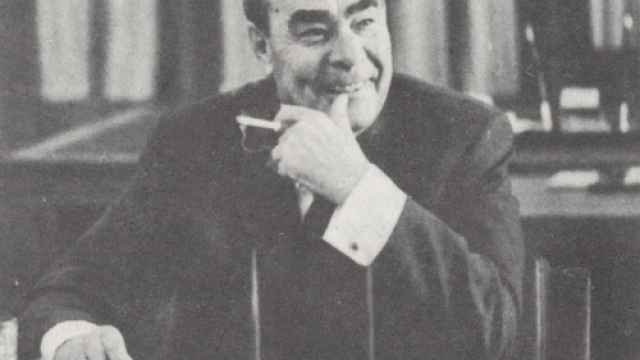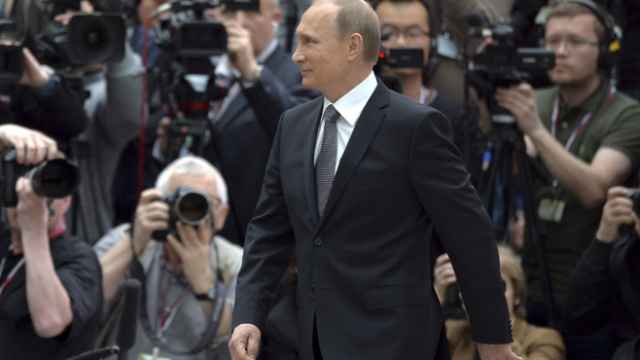Last week President Vladimir Putin told participants in a business forum, "Today, as you know, they are already taking talented children to study abroad through various foundations — God grant them health. They screen university applicants, sign contracts with them so they go there, and few of them return. We need to think this over, this initial step of preparation. Soon we might be bringing engineers here from overseas."
It was no accident that, in referring to scholarly foundations, Putin used the phrase "God grant them health." Translated from Kremlinese, that actually means "Off with their heads."
In fact, the same day Putin made this speech, the Justice Ministry labeled Dynasty, Russia's largest and best private foundation for scientific research, a "foreign agent" — a moniker that, not surprisingly, does not exactly help you "make friends and influence people" in Russia.
In Stalinist times, when officials got the order to shoot someone, their first step was to brand them a "foreign agent." Soviet officials branded people "foreign agents" who had never stepped foot outside the country as well as those who had never even seen a foreigner, much less hatched a scheme with one.
When a scholarly foundation is dubbed a "foreign agent," what type of work would the average Russian imagine it actually does? Export Russia's most talented children, of course. They doubtless scour the entire country looking for capable young men and women and then send them away.
Putin probably has an intelligence brief on his desk listing the number of children that Dynasty sent to study abroad. And it's true, Dynasty has sent many — but nobody bothers to consider what an enormous contribution they make to Russian science when they return. Government propaganda is constantly reinforcing the message that Russians are better than everyone else. Especially in science.
No, Russia will not hand over its children. They are needed here. An old Russian proverb states: "You are always most useful at home." Moscow leaders already prohibited U.S. citizens from adopting its orphans. Now they will make sure its brightest students don't get any bright ideas about improving their minds abroad.
In fact, that proverb always reminds me of a tragic story that occurred several years before Putin decided that Russia's orphans are better off in Russian orphanages than in U.S. homes.
It is the story of Sergei Makeyev, a boy who lived in an orphanage in the Siberian city of Seversk in the Tomsk region. A couple from Spain wanted to adopt him. Of the four years he lived in that orphanage, the only time Sergei experienced mutual love was the few months he spent in Spain with this couple. Following his visit, the adoptive mother obtained the necessary documents and came to Seversk where she was unsuccessful in adopting the boy.
According to a local newspaper report, the local children's services official, who supposedly represented the child's interests, told the court: "There is a saying: 'You are always most useful at home.' I see no reason to believe that this child would be worse off in a Russian family."
After some time, she found a local family willing to take Sergei, the Seliverstovs. The municipal authorities immediately rewarded them with a four-room apartment. Soon after, the parents admitted Sergei to a psychiatric hospital. But the hospital discharged him on the grounds that he was perfectly healthy. Sergei ran away from his new family, and four months later was found drowned in drainage ditch near the Seversk power station.
Still, everyone benefited from the experience: the children's services official who blocked the adoption was promoted and is now a municipal chief, and the family that was persuaded to adopt Sergei continues living in their huge apartment.
Only Sergei is not here to congratulate them.
Andrei Malgin is a journalist, literary critic and blogger.
A Message from The Moscow Times:
Dear readers,
We are facing unprecedented challenges. Russia's Prosecutor General's Office has designated The Moscow Times as an "undesirable" organization, criminalizing our work and putting our staff at risk of prosecution. This follows our earlier unjust labeling as a "foreign agent."
These actions are direct attempts to silence independent journalism in Russia. The authorities claim our work "discredits the decisions of the Russian leadership." We see things differently: we strive to provide accurate, unbiased reporting on Russia.
We, the journalists of The Moscow Times, refuse to be silenced. But to continue our work, we need your help.
Your support, no matter how small, makes a world of difference. If you can, please support us monthly starting from just $2. It's quick to set up, and every contribution makes a significant impact.
By supporting The Moscow Times, you're defending open, independent journalism in the face of repression. Thank you for standing with us.
Remind me later.






